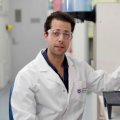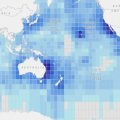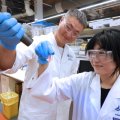A new University of Queensland program aimed at changing the lives of people who experience language difficulties after stroke will be trialled in South East Queensland major hospitals.
The Australia-first program, Aphasia LIFT (Language Impairment and Functioning Therapy), has received a $751,000 National Health and Medical Research Partnership Projects grant designed to improve the translation of research into health policy and practice.
Aphasia is a language disorder that can affect a person's ability to talk, read, write and understand the spoken word, and can occur after stroke, traumatic brain injury, or brain cancer.
UQ Deputy Vice-Chancellor (Research) Professor Max Lu welcomed the NHMRC funding of $751,000 to this aphasia program and congratulated the research team from UQ, Monash, The Wesley Hospital and the Gold Coast Hospital.
“The program will potentially place Queensland at the forefront of aphasia treatment in Australia.
“It is a great example of the strength that collaborative partnerships between universities, hospitals, private organisations and government bodies can bring to improving the health of the community,” Professor Lu said.
Lead investigator Professor Linda Worrall, from UQ's School of Health and Rehabilitation Sciences, said the funding would be used to trial the Aphasia program in hospitals and compare the results with patients who receive current standard treatment.
The Aphasia LIFT program consists of a three-week intensive program including daily individual therapy, computer training and group sessions.
“A review of aphasia therapy studies have shown that higher-intensity rehabilitation may improve recovery from brain injury,” Professor Worrall said.
“It’s hard work, but participants enjoy the intensity and have achieved significant improvement in their ability to retrieve words, which is the major challenge with aphasia.
“Many have been able to achieve specific communication goals such as reading a book to their child at bedtime.”
Partner organisations involved in trialling the Aphasia LIFT program include the Wesley Research Institute, Gold Coast Hospital and Health Service, Wesley Hospital, Mater Hospital, Logan and Beaudesert Hospitals, Princess Alexandra Hospital, Queen Elizabeth II Jubilee Hospital, CheckUP and Prince Charles Hospital.
The team of researchers include:
• Professor Linda Worrall, Director, CCRE in Aphasia Rehabilitation, The University of Queensland
• Associate Professor David Copland, ARC Future Fellow and Research Speech Pathologist, UQ Centre for Clinical Research, The University of Queensland
• Ms Melissa Lawrie, Director, Speech Pathology, Gold Coast Hospital, Southport
• Professor Elizabeth Ward, , Centre for Functioning and Health Research, Queensland Health, and School of Health and Rehabilitation Sciences, The University of Queensland
• Dr Moya Pattie, Senior/Team Leader Speech Pathologist, The Wesley Hospital
• Dr Asad Khan, Biostatistician, School of Health and Rehabilitation Sciences, The University of Queensland
• Dr Jacob Veerman, Centre for Burden of Disease and Cost-Effectiveness, The University of Queensland
• Dr Denise O'Connor, Senior Research Fellow & Public Health Fellow, Monash University.
Media Contact: : Kirsten O’Leary, Media and Communications, The University of Queensland Faculty of Health Sciences, 07 3346 4713, 0412307594 or k.oleary@uq.edu.au
Interviews:
Interviews can be arranged with UQ lead investigator Professor Linda Worrall and Aphasia patient 41-year-old Bruce Aisthorpe, who participated in the Aphasia LIFT program and has experienced a significant improvement in his communication.
Resources for media:
• Aphasia website
• Video including comments from the Lead Investigator Professor Linda Worrall on Aphasia and patient stories. Password is “Lift” and please credit ‘Footage courtesy of hartflicker Moving Pictures’
.jpg)











